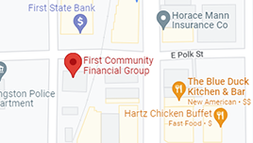First Community Financial Group, Inc. Blog |
|
Whether you bought a new or used mobile home, odds are that when you purchased it the design wasn't exactly what you wanted. Builders may not use the most high-end materials on new builds, and if it's an older model, it may be time for an update. If you ever plan to revamp a room in your mobile home, consider starting with the kitchen. It can make your mobile home look more modern, and they can have some of the best return-on-investment rates.*
If you're not sure where to start in your kitchen or if you're looking for inspiration, you're in the right place. Foremost® has done some research for you and put together a list of ideas you can use to give your kitchen a more updated look!
We hope some of these suggestions fit into your budget and give you the motivation to get started. Good luck on your DIY journey!
0 Comments
The wind in your hair, the sun on your face, and the open water in front of you. Sound appealing? Then you might want to join the ranks of boat owners all over the country. But before you cut through that clear blue water, there are some things you may want to keep in mind. Whether you're buying a fishing boat, cabin cruiser, pontoon or speed boat, different components like cost, horsepower, weight capacity or onboard storage may prove to be more important to you than others.
Answer these questions before going boat shopping: What are you hoping to use your boat for? All boat styles have a different design tailored to the use. Speed boats may be better for tubing and water skiing but wouldn't hold as many people or be as suited for fishing as a dedicated fishing boat or a pontoon. Maybe you'll want to sail or spend time living on the open water in a houseboat. There are so many different varieties of boats, brands and manufacturers, so make an informed decision on which one is right for you. What's your budget? This may help decide whether to buy a used boat. According to Discover Boating, new boats depreciate anywhere between 25%-33% immediately after leaving the dealer's lot. So, if you buy a used boat, someone else has already paid that depreciation cost - more boat for fewer dollars! However, buying a new boat will offer a warranty, the newest technology, and that nice shiny look as you move across the water - the choice is up to you! How many people are you hoping to go on your boating excursions with? The capacity on personal fishing boats is generally smaller than a pontoon boat, which are made to hold anywhere between 8-15 adults comfortably. What type of equipment will you want onboard? Here's some suggestions:
Will your car be able to tow your boat? A 20-foot boat trailer can range from 600 to 1,000 pounds, and most boats in this size range hover in the 4,000-5,000 pound range.* This means that you'll want an SUV or truck that is rated to tow between 4,500-6,000 pounds in total. Where are you placing your boat in the off-season? Having storage for your boat during the colder months is important and must be planned ahead. Some may place their boat in their garage, outside of their garage or in a separate storage space. And a few other components to consider…
No matter what you decide, get out there, matey, and enjoy the open seas! Looking for boat insurance? Get a quote today by calling 888-244-8092 to speak with a licensed agent or find a Foremost insurance agent near you. Or contact us at First Community Financial Group. We are a Foremost agency! Content provided by Foremost Insurance. Whether you were caught speeding (or worse) or you simply want to be a better driver, there are a wide range of defensive driving and driver improvement courses available in Texas these days.
But which is right for you? Here are five tips to help you decide: 1. Check with your state or municipality. If you’re taking training to avoid a traffic infraction, not just any course will do. You’ll need to take an approved course – ask for a list before signing up. 2. Check with your insurer. The same goes if you’d like to potentially save on your car insurance. Your carrier may only offer a car insurance discount for completing certain courses. Also ask how much your discount will be — this will help when it comes time to choose a course. 3. Choose the type of course. There are online and classroom options, typically ranging from 4-12 hours depending on the course material. And there are advantages to each. Online courses offer convenience (and sometimes a lower cost), while in-person settings can provide more interaction. 4. Determine how much you want to spend. If you’re trying to avoid a ticket (and a potential increase in your insurance premiums), the cost might not be much of an issue. If you’re taking a course to receive an insurance discount, however, make sure the total discount you’ll receive is greater than the cost of the course. 5. Check out the reviews. Online review sites, such as Yelp, can show you what others thought of a course. Keep in mind, people who felt “forced” to take a course might have a biased opinion, especially compared to someone who took the course willingly. No matter why you’re considering a defensive driving course, we’re happy to help you weigh the pros and cons. The biggest pro being, once you complete your training, you’re likely to be a little more careful the next time you get behind the wheel. And, that always pays off!  Tornadoes have caused severe and irreparable damage to tens of thousands of Americans and their property in recent years. On top of the physical and emotional fallout, many have also lost their lives as a direct result of a tornado. Onalaska, TX suffered a direct hit in April 2020. The results were devastating for so many! Although you can never control the weather or the outcome of a destructive storm, there are steps you can take to help you and your family remain protected in the event of a tornado. Those steps of action begin with knowing fact from myth. Here are a few tornado truths that could help keep you and those you love safe:
At First Community Financial Group, we want to help you know the tornado truths that will help keep you and your family safe. For more tornado safety tips, visit the Storm Prediction Center’s comprehensive guide at http://www.spc.noaa.gov/faq/tornado/safety.html. Contact Us! At First Community Financial Group, we can work with you to make sure you've got the coverage you need, while at the same time using all possible credits and discounts to make that coverage affordable. Just give us a call at (936) 327-4364 or send us a note at [email protected]. We want to help you meet your goals, and make sure what's important to you is protected! Content provided by Safeco Insurance  From genetically modified crops to the environmental and health effects of pesticides, more and more Livingston and East Texas residents are questioning whether they should grow what they eat. Wherever you stand on the issues surrounding today’s food supply, however, there are several good reasons to start your own garden:
Clearly there are plenty of benefits to gardening. But how do you get started? Here are some important tips from the Oregon State University (OSU) Extension Service, which, like similar services around the country, provides helpful community resources on agriculture and other topics. Pick the Right Site “Choosing a garden site is as important as selecting the vegetables to grow in it,” according to the OSU Extension website. “All vegetables need sunlight and fertile, well-drained soil, and they will contract fewer diseases if the site has good ventilation.” Here’s what to consider before marking your garden plot:
Choose What to Plant Check with a local gardening organization or search the Web for what vegetables are best for your specific situation and climate. Here are three factors to keep in mind when you’re getting ready to plant, according to the OSU extension:
Water Wisely The best way to water is by monitoring your garden, rather than simply adhering to a set schedule. Follow guidelines for your specific plants, and avoid these common problems, as noted by the OSU Extension website:
For more specific advice on gardening in our zone in East Texas, check with the local university extension program. And, don’t worry; you don’t have to be an expert to enjoy homegrown food. You just need to be willing to put in a little time and effort — and get your hands dirty! |
Contact Us(936) 327-4364 Archives
May 2024
Categories
All
|




 RSS Feed
RSS Feed
